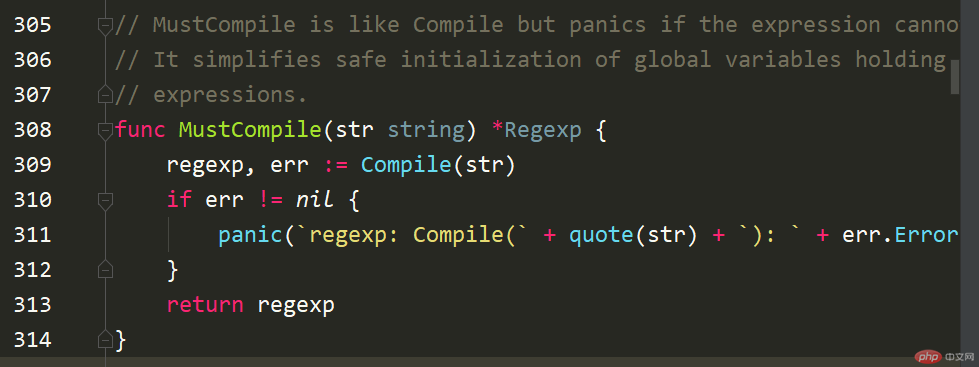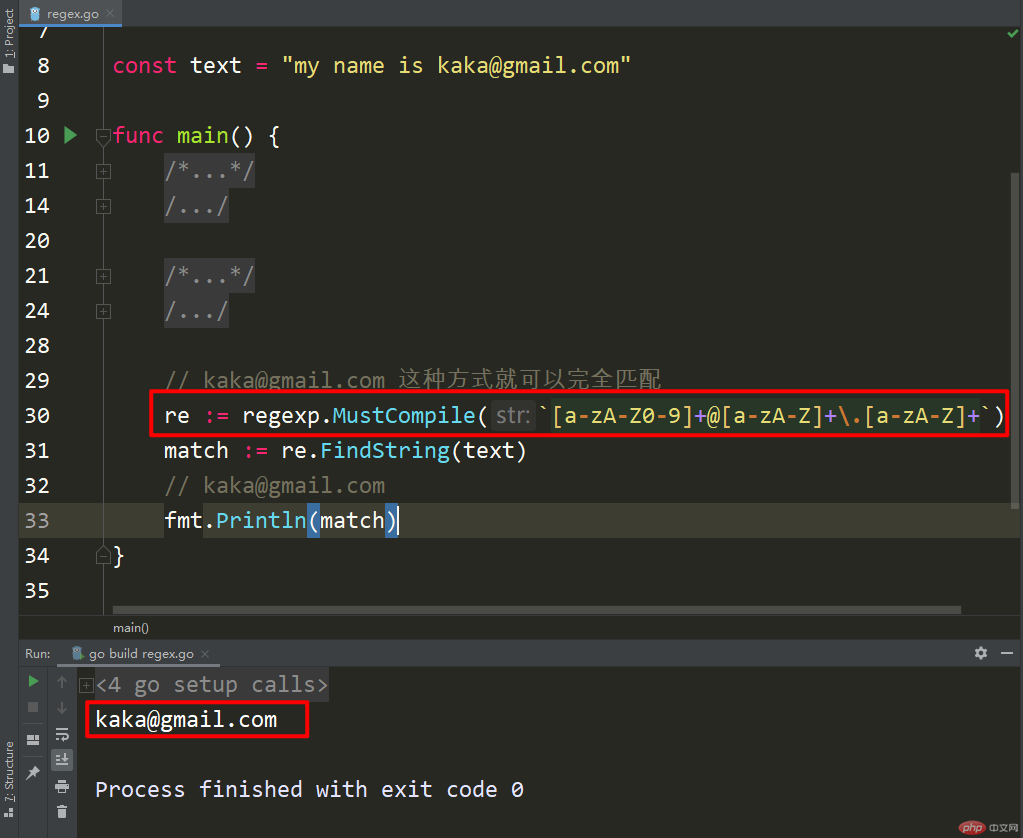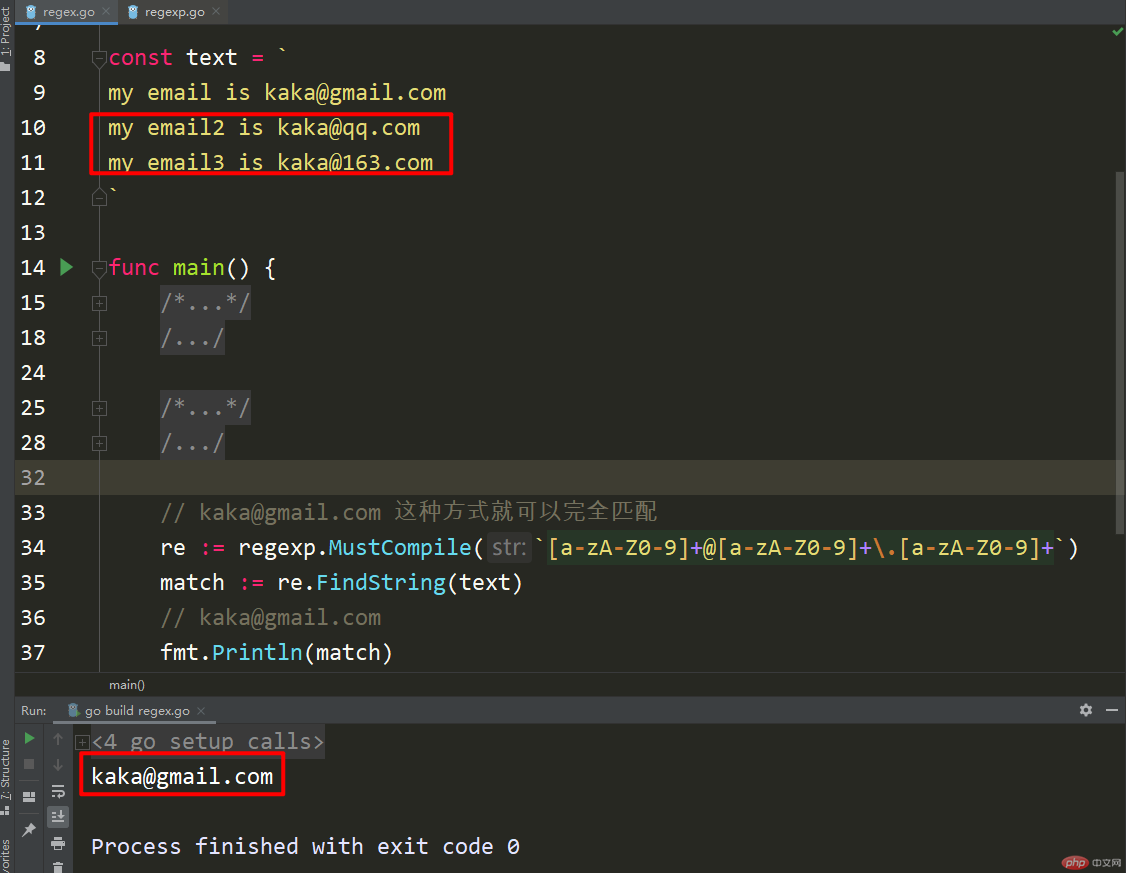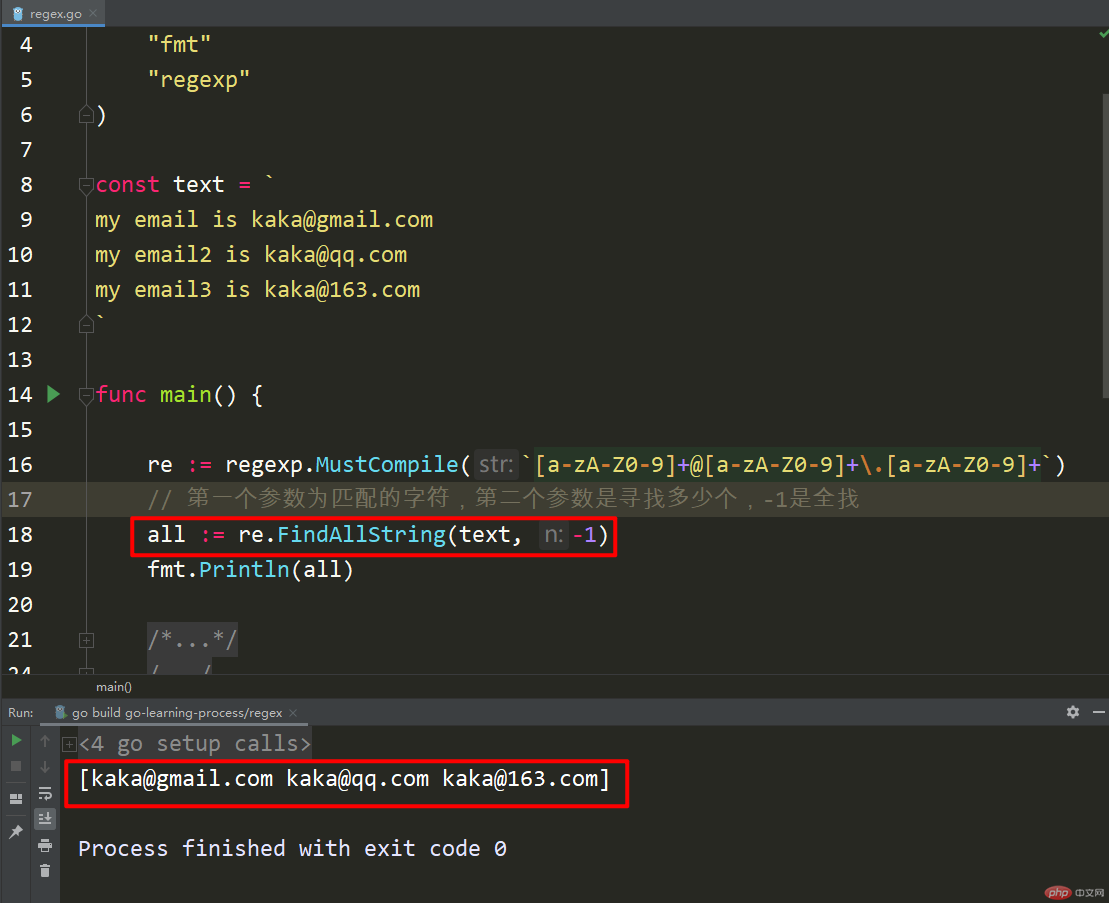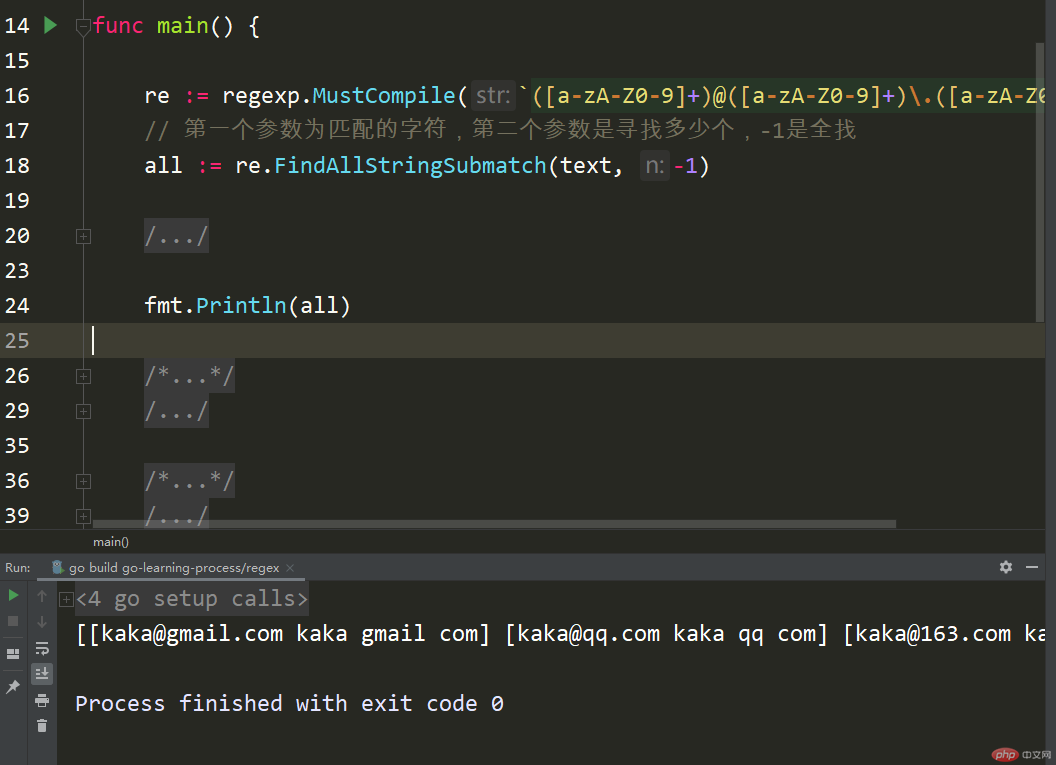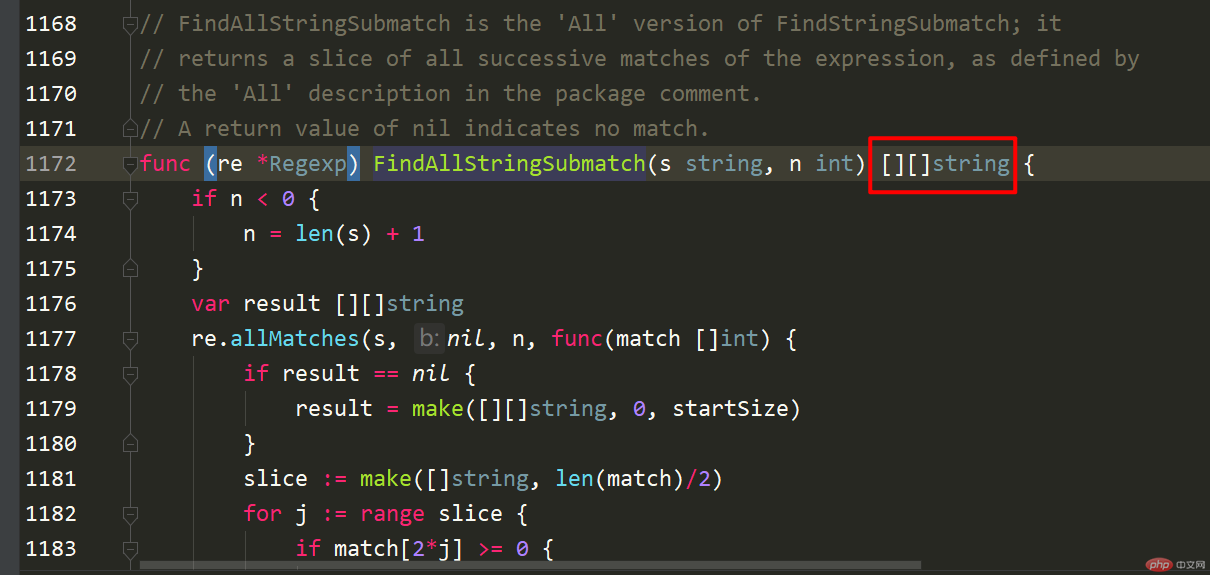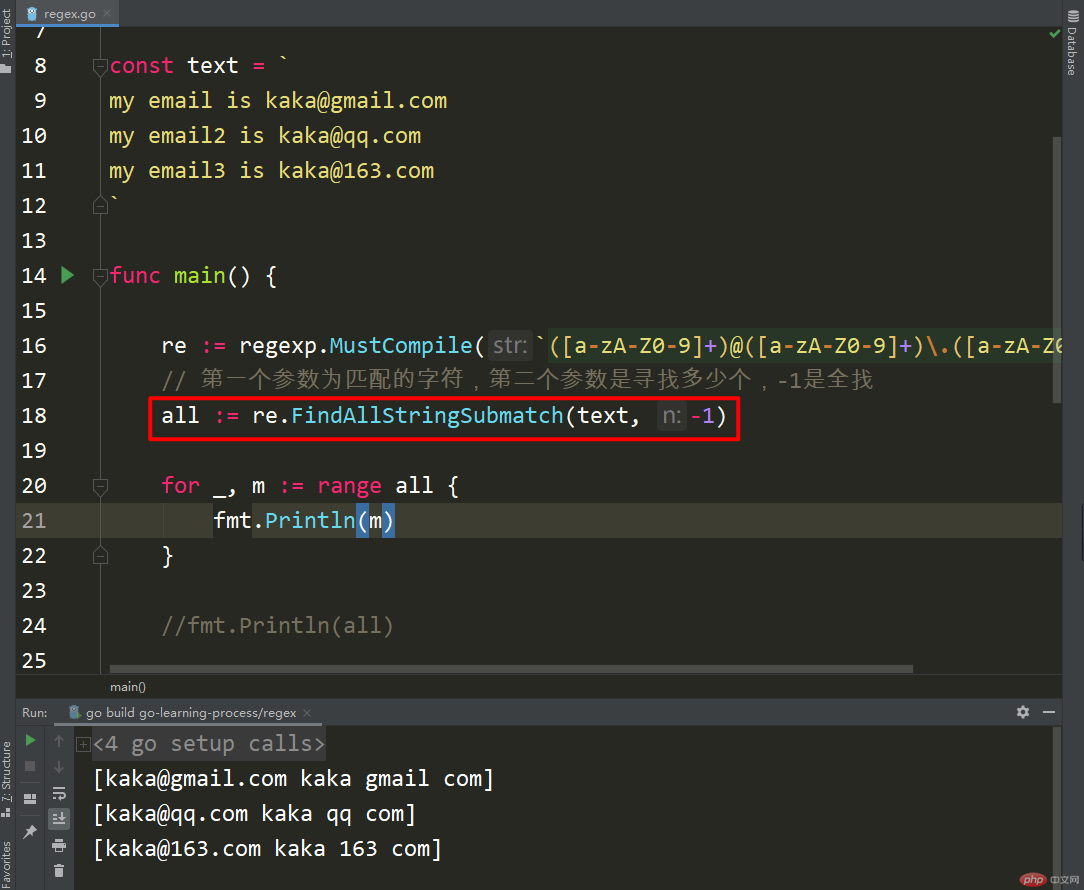Using regular expressions in Go
“This article will take you through how to use regular expressions in Go
”
##1. Demonstration case
In this case, the constant text is declared and then the regexp.Compile method of the regexp package is used. . This method is to determine whether the value entered by the user meets the matching rules. Of course, you can also see that the result returns the data we need.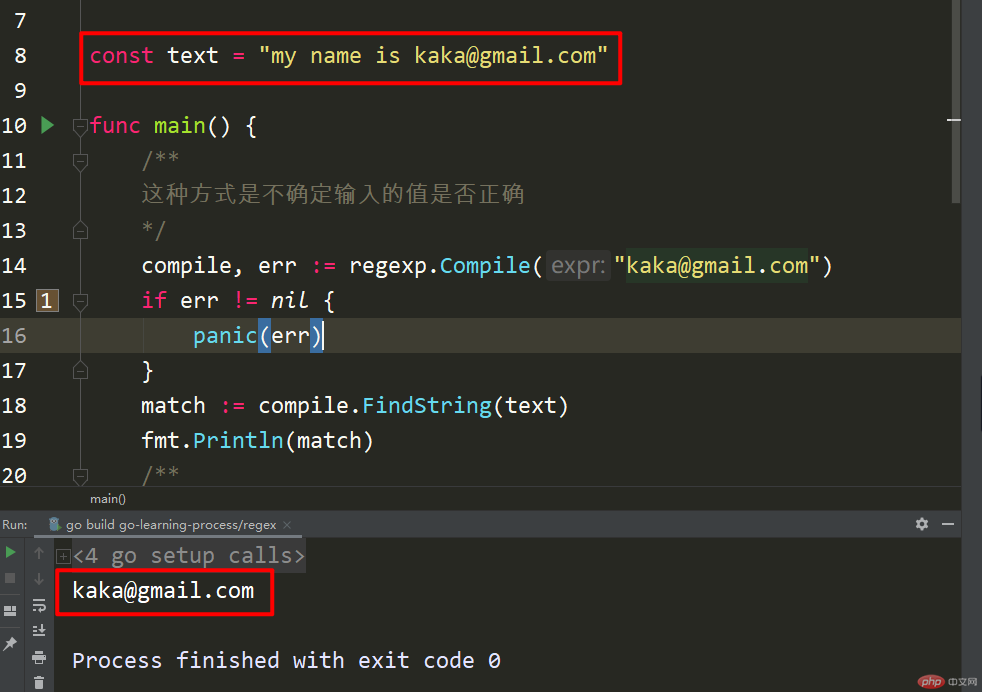
regexp.MustCompile uses this method and the returned value is the same.
2. Regular matching
Next we use regular expressions for matching, that is, regular expression matching in the method above.
The case is consistent with the one used in the figure above and is used to match email addresses.
Then write the first version first.
You can see that the returned result is what we want.
This part about how to write regular expressions is explained here. This article is mainly about how to use regular expressions in go.
The first problem will be reflected at this time, which is the FindString method Only one value can be matched.
How to match multiple values! Please see the case below
3. Match multiple values
You can see that the returned result is all that can be matched All the email addresses were matched.
To match multiple values, you need to use the FindAllString method.
The first parameter is the matching character, the second parameter is how many to search for, -1 is to search for all
Go provides a very good way to directly extract the email name, email domain name, and email suffix, so what should be done!
4. Regular expression extraction content
You cannot continue to use the method in the above case here. You need to Use FindAllStringSubmatchThis method
In this method you can know that what is returned is a two-dimensional String. From the return result in the above figure, we can also know that what is returned is a two-dimensional string.
Since a two-dimensional string slice is returned, we can loop to obtain each extracted content.
You can see that four matches were returned, the first one is complete, and the following three are the content we obtained.
5. Summary
Passed The above four cases briefly understand how to use regular expressions in Go, simulated several scenarios, and used the regular expression package in Go.
This case can also be regarded as an exercise for go. It does not have much in-depth content. It is mainly about the use of regular packages. The most important thing is the last case. This kind of regular expression extracts content in the crawler project. is very common.
“Persistence in learning, persistence in blogging, and persistence in sharing are the beliefs that Kaka has always upheld since his career. I hope that Kaka’s articles in the huge Internet can bring you a little Please help. My name is Kaka, see you in the next issue.
”
Recommended: "golang tutorial"
The above is the detailed content of Using regular expressions in Go. For more information, please follow other related articles on the PHP Chinese website!

Hot AI Tools

Undresser.AI Undress
AI-powered app for creating realistic nude photos

AI Clothes Remover
Online AI tool for removing clothes from photos.

Undress AI Tool
Undress images for free

Clothoff.io
AI clothes remover

AI Hentai Generator
Generate AI Hentai for free.

Hot Article

Hot Tools

Notepad++7.3.1
Easy-to-use and free code editor

SublimeText3 Chinese version
Chinese version, very easy to use

Zend Studio 13.0.1
Powerful PHP integrated development environment

Dreamweaver CS6
Visual web development tools

SublimeText3 Mac version
God-level code editing software (SublimeText3)

Hot Topics
 How to send Go WebSocket messages?
Jun 03, 2024 pm 04:53 PM
How to send Go WebSocket messages?
Jun 03, 2024 pm 04:53 PM
In Go, WebSocket messages can be sent using the gorilla/websocket package. Specific steps: Establish a WebSocket connection. Send a text message: Call WriteMessage(websocket.TextMessage,[]byte("Message")). Send a binary message: call WriteMessage(websocket.BinaryMessage,[]byte{1,2,3}).
 How to avoid memory leaks in Golang technical performance optimization?
Jun 04, 2024 pm 12:27 PM
How to avoid memory leaks in Golang technical performance optimization?
Jun 04, 2024 pm 12:27 PM
Memory leaks can cause Go program memory to continuously increase by: closing resources that are no longer in use, such as files, network connections, and database connections. Use weak references to prevent memory leaks and target objects for garbage collection when they are no longer strongly referenced. Using go coroutine, the coroutine stack memory will be automatically released when exiting to avoid memory leaks.
 In-depth understanding of Golang function life cycle and variable scope
Apr 19, 2024 am 11:42 AM
In-depth understanding of Golang function life cycle and variable scope
Apr 19, 2024 am 11:42 AM
In Go, the function life cycle includes definition, loading, linking, initialization, calling and returning; variable scope is divided into function level and block level. Variables within a function are visible internally, while variables within a block are only visible within the block.
 How to match timestamps using regular expressions in Go?
Jun 02, 2024 am 09:00 AM
How to match timestamps using regular expressions in Go?
Jun 02, 2024 am 09:00 AM
In Go, you can use regular expressions to match timestamps: compile a regular expression string, such as the one used to match ISO8601 timestamps: ^\d{4}-\d{2}-\d{2}T \d{2}:\d{2}:\d{2}(\.\d+)?(Z|[+-][0-9]{2}:[0-9]{2})$ . Use the regexp.MatchString function to check if a string matches a regular expression.
 The difference between Golang and Go language
May 31, 2024 pm 08:10 PM
The difference between Golang and Go language
May 31, 2024 pm 08:10 PM
Go and the Go language are different entities with different characteristics. Go (also known as Golang) is known for its concurrency, fast compilation speed, memory management, and cross-platform advantages. Disadvantages of the Go language include a less rich ecosystem than other languages, a stricter syntax, and a lack of dynamic typing.
 How to view Golang function documentation in the IDE?
Apr 18, 2024 pm 03:06 PM
How to view Golang function documentation in the IDE?
Apr 18, 2024 pm 03:06 PM
View Go function documentation using the IDE: Hover the cursor over the function name. Press the hotkey (GoLand: Ctrl+Q; VSCode: After installing GoExtensionPack, F1 and select "Go:ShowDocumentation").
 A guide to unit testing Go concurrent functions
May 03, 2024 am 10:54 AM
A guide to unit testing Go concurrent functions
May 03, 2024 am 10:54 AM
Unit testing concurrent functions is critical as this helps ensure their correct behavior in a concurrent environment. Fundamental principles such as mutual exclusion, synchronization, and isolation must be considered when testing concurrent functions. Concurrent functions can be unit tested by simulating, testing race conditions, and verifying results.
 Golang framework documentation best practices
Jun 04, 2024 pm 05:00 PM
Golang framework documentation best practices
Jun 04, 2024 pm 05:00 PM
Writing clear and comprehensive documentation is crucial for the Golang framework. Best practices include following an established documentation style, such as Google's Go Coding Style Guide. Use a clear organizational structure, including headings, subheadings, and lists, and provide navigation. Provides comprehensive and accurate information, including getting started guides, API references, and concepts. Use code examples to illustrate concepts and usage. Keep documentation updated, track changes and document new features. Provide support and community resources such as GitHub issues and forums. Create practical examples, such as API documentation.




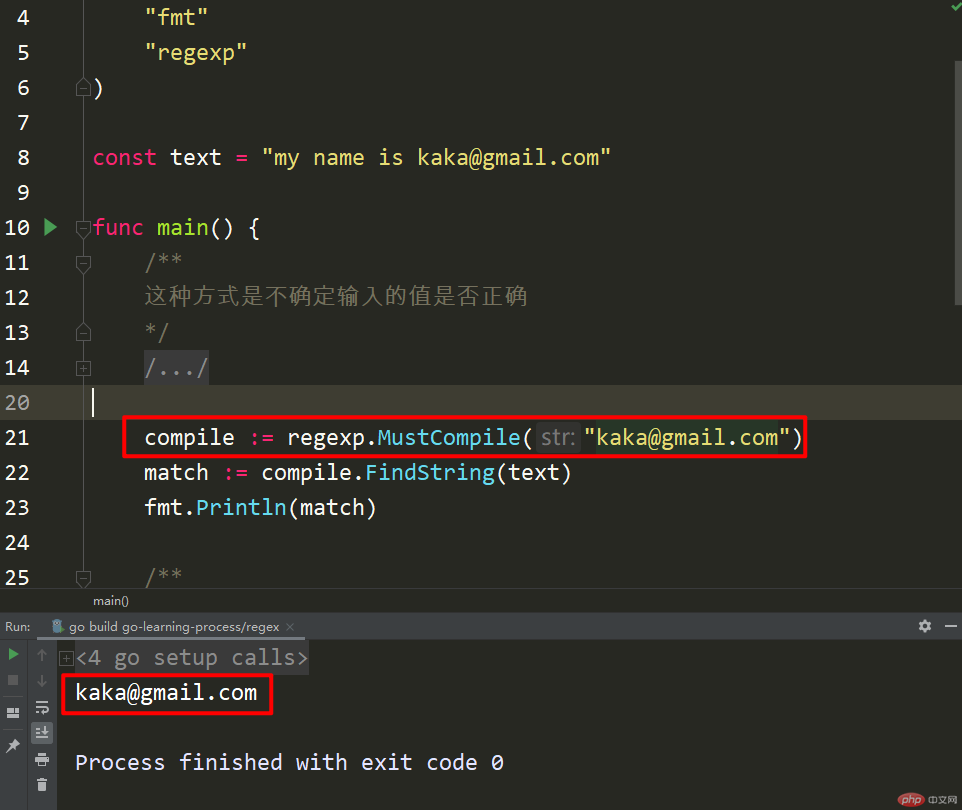 When the user is sure that the input is completely consistent, it can be used.
When the user is sure that the input is completely consistent, it can be used. 